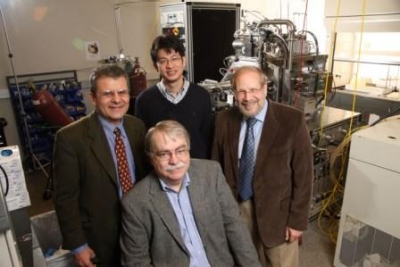May 25, 2011 — The University of Virginia, in partnership with the College of William & Mary and Old Dominion University, has launched the Virginia Nanoelectronics Center (ViNC) for nano-electronics research. The ViNC will operate under the U.Va. Institute for Nanoscale and Quantum Scientific and Technological Advanced Research (nanoSTAR).
Top researchers will develop advanced materials, novel devices and circuits at nanoscale dimensions here. An important aspect of ViNC researchers’ work will be the discovery and development of materials for advanced information technologies. ViNC will develop novel devices and circuits for "beyond CMOS" nanoelectronics.
The center’s initial project will be to develop information processing based on vanadium dioxide, aiming for smaller and faster processing at much lower power than available technologies.
 |
|
Clockwise from left: Mircea Stan, professor of electrical and computer engineering; Jiwei Lu, research assistant professor of materials science and engineering; Stuart Wolf, ViNC director and professor of materials science and engineering and physics, Lloyd Harriott, professor in the Department of Electrical and Computer Engineering. |
Micron Technology, which owns a memory chip fab in Manassas, VA, helped the universities launch the nanotechnology center. Micron has a long-term research partnership with the University of Virginia, said Scott DeBoer, Micron VP of process research and development, citing the school’s next-generation memory and logic switch technologies research under nanoSTAR, the Virginia Microelectronics Consortium, and the Nanoelectronics Research Initiative.
This center grew, in part, from an earlier project, "Towards Establishment of an Industry-State-Federal National Center in Nanoelectronics," funded by the Commonwealth Research Commercialization Fund (previously known as the Commonwealth Technology Research Fund) and Micron Technology. The initiative is funded by major semiconductor companies, Micron Technology, Intel, IBM, Texas Instruments and GLOBALFOUNDRIES, as well as the National Institute of Standards and Technology. The Nanoelectronics Research Initiative, one of three research program entities of the Semiconductor Research Corporation (SRC), supports the center, with help from the commonwealth of Virginia through the Virginia Microelectronics Consortium, an industry-university, state-funded consortium to promote microelectronics in Virginia.
"This center could establish the [Virginia] as the ‘Oxide Hills’ rather than a new Silicon Valley," said Stuart Wolf, director of nanoSTAR and ViNC.
Wolf, a professor with joint appointments in the U.Va. Engineering School’s Department of Materials Science and Engineering and in the College of Arts & Sciences’ Department of Physics, previously worked for more than 12 years with the Defense Advanced Research Projects Agency (DARPA), where he directed funding of more than $200 million for computing research projects.
Wolf will work closely with co-principal investigators Jiwei Lu, assistant professor of materials science and engineering, and Mircea Stan and Lloyd Harriott, professors in the Department of Electrical and Computer Engineering. Ale Lukaszew from the College of William & Mary and Helmut Baumgart from Old Dominion University will also serve as co-principal investigators.
The center is being established with starting grants from the Nanoelectronics Research Initiative and the Virginia Microelectronics Consortium and matching funds from the three participating universities, for a total of nearly $1.7 million over two years. The center’s projects are also funded by National Science Foundation and the Defense Advanced Research Projects Agency.
Follow Small Times on Twitter.com by clicking www.twitter.com/smalltimes. Or join our Facebook group

